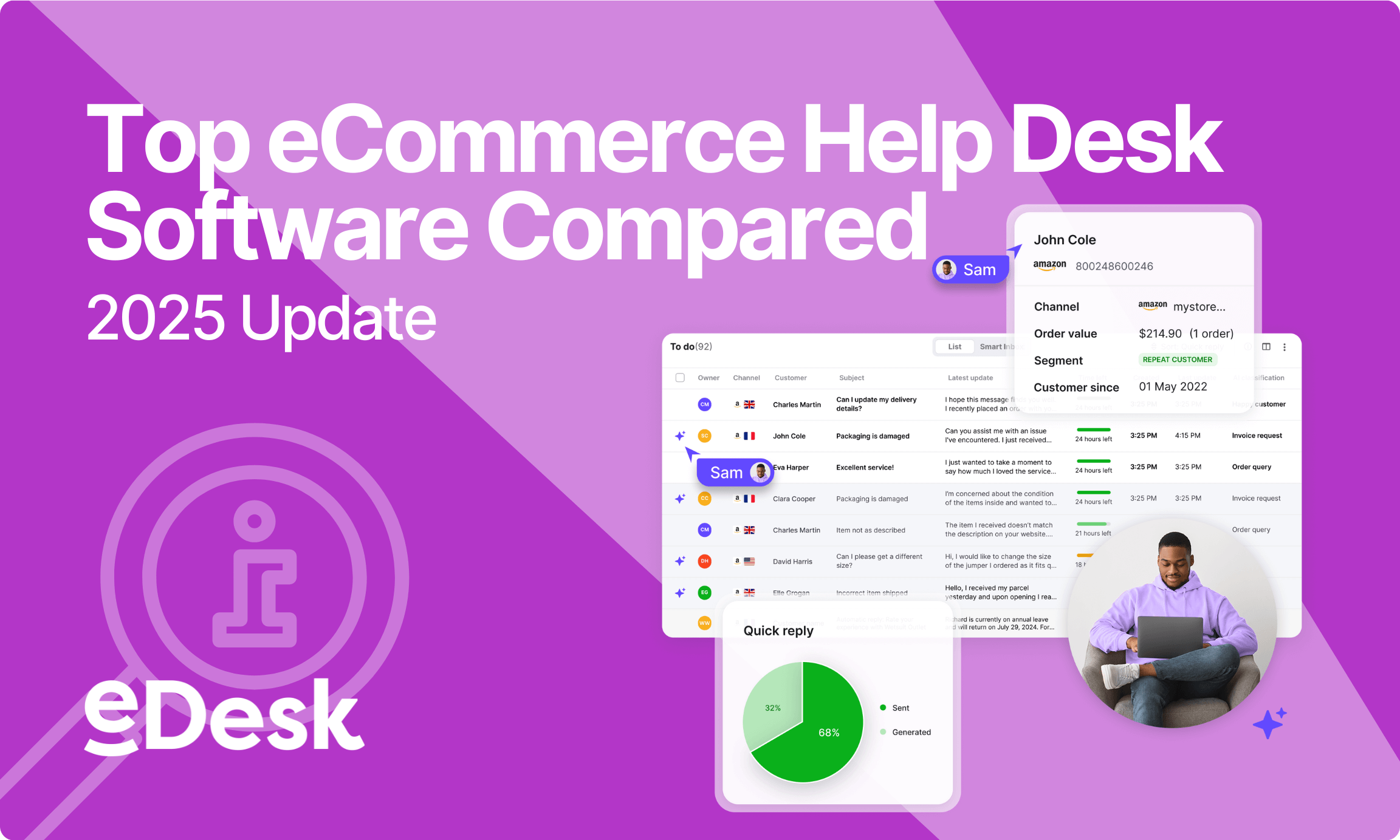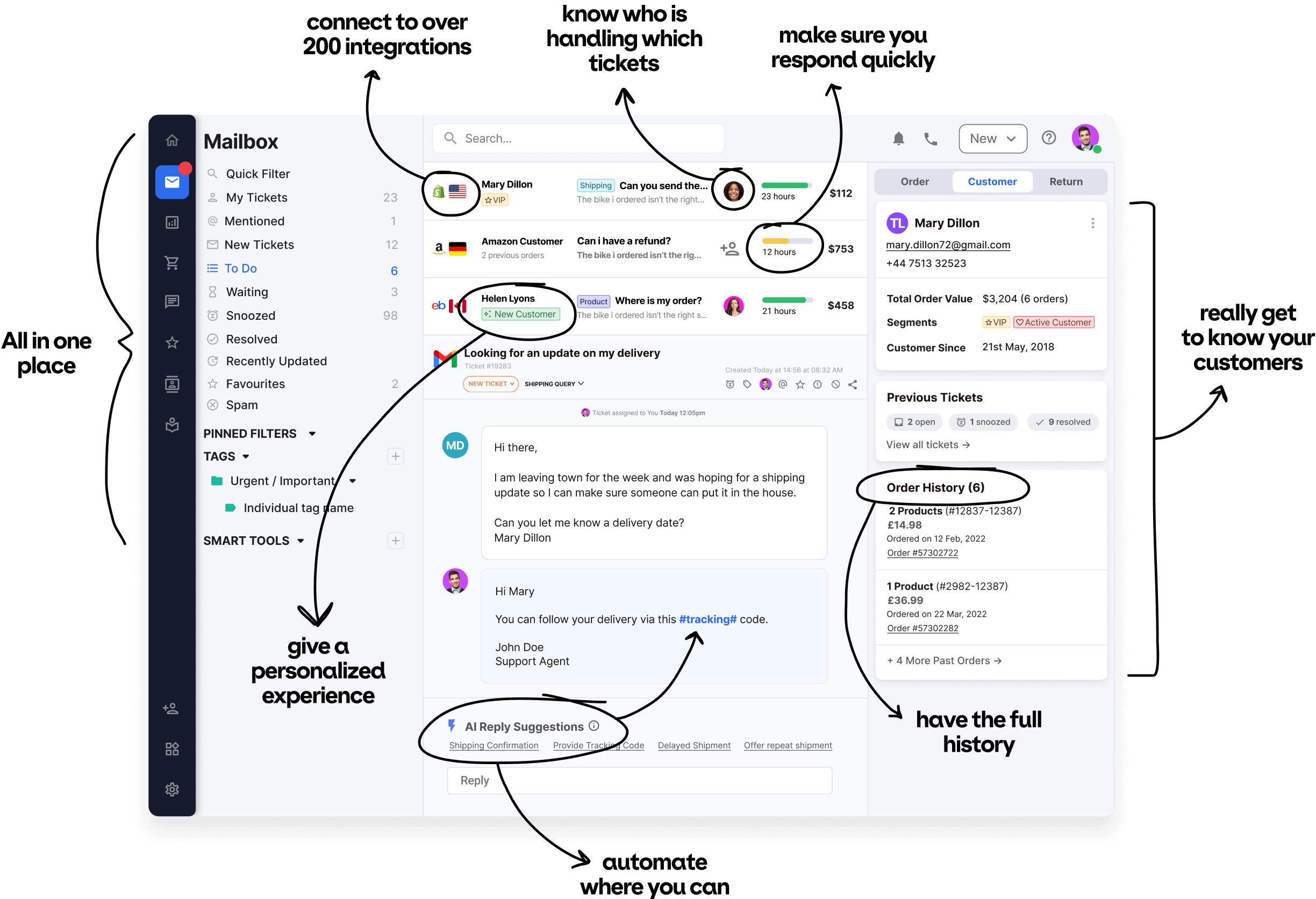Are you looking for the best eCommerce help desk software for 2026? Whether you’re an eCommerce business owner that handles support for marketplaces like Amazon and eBay or running a rapidly expanding Shopify store, selecting the correct help desk tool is crucial. The top solutions do more than just manage support issues; they also link with your storefront, centralize customer messages, and improve support operations.
In this guide, we look at the best eCommerce-only help desk software – built specifically for the needs of online sellers. We compare their major features, pricing, and who each platform is best suited for, so you can find the best fit and provide faster, more effective customer service.
What is eCommerce Help Desk Software?
An eCommerce help desk is customer service software that automates support for online stores. Unlike generic support systems, these tools integrate order data, manage multichannel queries, and provide automation for online retail difficulties such as returns, tracking updates, and delivery delays.
eDesk
If you sell on Amazon and eBay and have your own online business, eDesk could be the tool that saves your sanity. It consolidates all your client messages, orders, and tracking information into a single, user-friendly dashboard.
Why eDesk stands out:
- Connects with more than 200 sales channels (such as Shopify, eBay, Amazon, Walmart, etc.)
- Detailed order and shipment information is displayed in each ticket
- AI methods are used to improve response time and prioritize messages
- Integrated SLA timers, templates, and performance tracking
- Streamlined returns management workflows
Ideal for: Busy teams who provide support across many sales platforms.
Pricing: After a 14-day free trial, there are four solutions offered at different degrees of support, ranging from Performance+ to Enterprise.
Why sellers love it: It’s designed specifically for eCommerce, rather than as a standard support desk with add-on features. It feels like a support control center, tailored to sellers that manage many storefronts.
Bonus: eDesk provides review request automation and data to help you boost your seller ratings on marketplaces such as Amazon.
Other eCommerce Help Desk Providers
While eDesk is a top choice for multichannel sellers, other eCommerce-only platforms may be a fit depending on your specific store setup.
- Gorgias
Designed with DTC brands in mind, particularly Shopify-based stores. - Richpanel
Offers self-service portals and a strong focus on customer experience for Shopify and WooCommerce. - Replyco
Built to help marketplace sellers manage customer messages in one unified inbox.
FAQs: eCommerce Help Desks in 2026
What’s the best help desk for multi-channel eCommerce sellers?
eDesk is designed specifically for marketplace and multichannel sellers. It offers over 200 integrations, allowing you to easily centralize support.
Which platforms work best with Shopify?
eDesk and Gorgias both integrate well with Shopify. In addition to Shopify integration, eDesk offers greater native marketplace context.
Are there any free eCommerce help desks?
Some platforms offer trials or limited-use plans, but dedicated eCommerce help desks are typically paid tools. eDesk offers a 14-day free trial with no credit card required.
What features should I look for in 2026?
- Order data in tickets
- Shipment and return tracking
- Integrated inbox across channels
- Automation and AI for ticket triage
- SLA tools and analytics
What’s best for reducing support ticket volume?
eDesk is an excellent tool for self-service and deflection, especially when integrated with marketplace and store data.
Which tool integrates best with Amazon and eBay?
eDesk is the clear winner here, with direct interfaces with Amazon, eBay, Walmart, and other platforms.
Considering Non-eCommerce-Specific Help Desks?
While the platforms above are built exclusively for eCommerce, some sellers may consider more general customer service solutions. However, it’s important to know these are not purpose-built for online retail.
- Zendesk
Zendesk is a well-known customer support platform that serves a broad range of industries, including healthcare, tech, and finance.
Why it’s not ideal for eCommerce: While powerful and flexible, Zendesk lacks native marketplace integrations and doesn’t provide eCommerce-specific workflows out of the box. Integrations often require third-party plugins and manual configuration. - Re:amaze
Re:amaze supports live chat, email, and social messaging and offers some Shopify and WooCommerce integrations.
Why it may fall short: Though popular with some DTC brands, Re:amaze isn’t a specialist eCommerce help desk. Key features like order management, marketplace syncing, and automated returns handling aren’t as deeply embedded as they are in purpose-built tools like eDesk.
If you’re looking for a support solution that deeply understands eCommerce workflows – especially across marketplaces – tools like eDesk will offer significantly more value, automation, and efficiency.
Final Thoughts
Choosing the right eCommerce help desk software for 2026 all depends on your channels, volume, and customer service style. It may take some time and a few free trials (eDesk offers a 14-day one), but finding the right eCommerce help desk software can be worth its weight in gold.
The right help desk software can make support more effective, customer-friendly, and scalable, allowing you to grow your business while keeping customers satisfied.
Try it for free today, with no credit card and no obligation.


